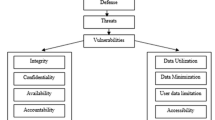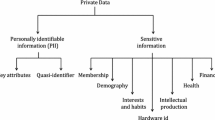Abstract
Private data is commonly revealed to the party performing the computation on it. This poses a problem, particularly when outsourcing storage and computation, e.g., to the cloud. In this paper we present a review of security mechanisms and a research agenda for privacy-preserving computation. We begin by reviewing current application scenarios where computation faces privacy requirements. We then review existing cryptographic techniques for privacy-preserving computation. And last, we outline research problems that need to be solved for implementing privacy-preserving computations. Once addressed, privacy-preserving computations can quickly become a reality enhancing the privacy protection of citizens.
Access this chapter
Tax calculation will be finalised at checkout
Purchases are for personal use only
Preview
Unable to display preview. Download preview PDF.
Similar content being viewed by others
References
Abadi, M., Morrisett, G., Sabelfeld, A.: Language-based security. Journal of Functional Programming 15(2), 129 (2005)
Abraham, I., Dolev, D., Gonen, R., Halpern, J.: Distributed computing meets game theory: Robust mechanisms for rational secret sharing and multiparty computation. In: Proceedings of the 25th ACM Symposium on Principles of Distributed Computing, PODC 2006 (2006)
Agrawal, R., Kiernan, J., Srikant, R., Xu, Y.: Order preserving encryption for numeric data. In: Proceedings of the ACM International Conference on Management of Data, SIGMOD 2004 (2004)
Almeida, J.B., Bangerter, E., Barbosa, M., Krenn, S., Sadeghi, A.-R., Schneider, T.: A certifying compiler for zero-knowledge proofs of knowledge based on σ-protocols. In: Gritzalis, D., Preneel, B., Theoharidou, M. (eds.) ESORICS 2010. LNCS, vol. 6345, pp. 151–167. Springer, Heidelberg (2010)
Backes, M., Maffei, M., Pecina, K.: Automated synthesis of privacy-preserving distributed applications. In: Proceedings of 19th Network and Distributed System Security Symposium, NDSS 2012 (2012)
Balasch, J., Rial, A., Troncoso, C., Preneel, B., Verbauwhede, I., Geuens, C.: Pretp: privacy-preserving electronic toll pricing. In: Proceedings of the 19th USENIX Conference on Security, USENIX Security 2010 (2010)
Bauer, G., Stockinger, K., Lukowicz, P.: Recognizing the use-mode of kitchen appliances from their current consumption. In: Barnaghi, P., Moessner, K., Presser, M., Meissner, S. (eds.) EuroSSC 2009. LNCS, vol. 5741, pp. 163–176. Springer, Heidelberg (2009)
Ben-David, A., Nisan, N., Pinkas, B.: Fairplaymp: a system for secure multi-party computation. In: Proceedings of the 15th ACM Conference on Computer and Communications Security, CCS 2008 (2008)
Ben-Or, M., Goldwasser, S., Wigderson, A.: Completeness theorems for non-cryptographic fault-tolerant distributed computation. In: Proceedings of the 20th ACM Symposium on Theory of computing, STOC 1988 (1988)
Berthold, O., Federrath, H., Köhntopp, M.: Project “anonymity and unobservability in the internet”. In: Proceedings of the 10th Conference on Computers, Freedom and Privacy: Challenging the Assumptions, CFP 2000 (2000)
Binnig, C., Hildenbrand, S., Färber, F.: Dictionary-based order-preserving string compression for main memory column stores. In: Proceedings of the ACM International Conference on Management of Data, SIGMOD 2009 (2009)
Bogdanov, D., Laur, S., Willemson, J.: Sharemind: A framework for fast privacy-preserving computations. In: Jajodia, S., Lopez, J. (eds.) ESORICS 2008. LNCS, vol. 5283, pp. 192–206. Springer, Heidelberg (2008)
Boldyreva, A., Chenette, N., Lee, Y., O’Neill, A.: Order-preserving symmetric encryption. In: Joux, A. (ed.) EUROCRYPT 2009. LNCS, vol. 5479, pp. 224–241. Springer, Heidelberg (2009)
Boneh, D., Di Crescenzo, G., Ostrovsky, R., Persiano, G.: Public key encryption with keyword search. In: Cachin, C., Camenisch, J.L. (eds.) EUROCRYPT 2004. LNCS, vol. 3027, pp. 506–522. Springer, Heidelberg (2004)
Camenisch, J., Van Herreweghen, E.: Design and implementation of the idemix anonymous credential system. In: Proceedings of the 9th ACM Conference on Computer and Communications Security, CCS 2002 (2002)
Cavoukian, A., Polonetskyand, J., Wolf, C.: Smart privacy for the smart grid: embedding privacy into the design of electricity conservation. Identity in the Information Society 3(2), 275–294 (2010)
Cramer, R., Damgård, I.B., Nielsen, J.B.: Multiparty computation from threshold homomorphic encryption. In: Pfitzmann, B. (ed.) EUROCRYPT 2001. LNCS, vol. 2045, pp. 280–300. Springer, Heidelberg (2001)
Damgård, I., Geisler, M., Krøigaard, M., Nielsen, J.B.: Asynchronous multiparty computation: theory and implementation. In: Jarecki, S., Tsudik, G. (eds.) PKC 2009. LNCS, vol. 5443, pp. 160–179. Springer, Heidelberg (2009)
Danezis, G., Livshits, B.: Towards ensuring client-side computational integrity (position paper). In: Proceedings of the ACM Cloud Computing Security Workshop, CCSW 2011 (2011)
Dingledine, R., Mathewson, N., Syverson, P.: Tor: the second-generation onion router. In: Proceedings of the 13th USENIX Conference on Security, USENIX Security 2004 (2004)
Dwork, C.: Differential privacy. In: Proceedings of the 33rd International Colloquium on Automata, Languages and Programming (2006)
Gentry, C.: Fully homomorphic encryption using ideal lattices. In: Proceedings of the 41st ACM Symposium on Theory of Computing, STOC 2009 (2009)
Gentry, C., Halevi, S.: Implementing gentry’s fully-homomorphic encryption scheme. In: Paterson, K.G. (ed.) EUROCRYPT 2011. LNCS, vol. 6632, pp. 129–148. Springer, Heidelberg (2011)
Goldreich, O.: The Foundations of Cryptography. Basic Applications, vol. 2. Cambridge University Press (2004)
Goldreich, O., Micali, S., Wigderson, A.: How to play any mental game. In: Proceedings of the 19th ACM Symposium on Theory of Computing, STOC 1987 (1987)
Goldwasser, S., Micali, S., Rackoff, C.: The knowledge complexity of interactive proof systems. SIAM Journal of Computing 18(1), 186–208 (1989)
Gordon, S.D., Katz, J.: Rational secret sharing, revisited. In: De Prisco, R., Yung, M. (eds.) SCN 2006. LNCS, vol. 4116, pp. 229–241. Springer, Heidelberg (2006)
Halpern, J., Teague, V.: Rational secret sharing and multiparty computation: Extended abstract. In: Proceedings of the 36th ACM Symposium on Theory of Computing, STOC 2004 (2004)
Hart, G.W.: Nonintrusive appliance load monitoring. Proceedings of the IEEE 80(12), 1870–1891 (1992)
Heck, W.: Smart energy meter will not be compulsory. NRC Handelsblad (April 2009), http://www.nrc.nl/international/article2207260.ece/Smart_energy_meter_will_not_be_compulsory
Henecka, W., Kögl, S., Sadeghi, A.-R., Schneider, T., Wehrenberg, I.: Tasty: tool for automating secure two-party computations. In: Proceedings of the 17th ACM Conference on Computer and Communications Security, CCS 2010 (2010)
Heydt-Benjamin, T.S., Chae, H.-J., Defend, B., Fu, K.: Privacy for public transportation. In: Danezis, G., Golle, P. (eds.) PET 2006. LNCS, vol. 4258, pp. 1–19. Springer, Heidelberg (2006)
Huang, Y., Evans, D., Katz, J., Malka, L.: Faster secure two-party computation using garbled circuits. In: Proceedings of the 20th USENIX Conference on Security, USENIX Security 2011 (2011)
Izmalkov, S., Micali, S., Lepinski, M.: Rational secure computation and ideal mechanism design. In: Proceedings of the 46th IEEE Symposium on Foundations of Computer Science, FOCS 2005 (2005)
Jamieson, A.: Smart meters could be ‘spy in the home’. Telegraph (UK) (October 2009), http://www.telegraph.co.uk/finance/newsbysector/energy/6292809/Smart-meters-could-be-spy-in-the-home.html
Jawurek, M., Johns, M., Kerschbaum, F.: Plug-in privacy for smart metering billing. In: Fischer-Hübner, S., Hopper, N. (eds.) PETS 2011. LNCS, vol. 6794, pp. 192–210. Springer, Heidelberg (2011)
Kerschbaum, F.: Adapting privacy-preserving computation to the service provider model. In: Proceedings of the International Conference on Privacy, Security, Risk and Trust, PASSAT 2009 (2009)
Kerschbaum, F.: Automatically optimizing secure computation. In: Proceedings of the 18th ACM Conference on Computer and Communications Security, CCS 2011 (2011)
Kerschbaum, F., Schaad, A.: Privacy-preserving social network analysis for criminal investigations. In: Proceedings of the 7th ACM Workshop on Privacy in the Electronic Society, WPES 2008 (2008)
Lisovich, M.A., Mulligan, D.K., Wicker, S.B.: Inferring personal information from demand-response systems. IEEE Security and Privacy 8(1), 11–20 (2010)
Lysyanskaya, A., Triandopoulos, N.: Rationality and adversarial behavior in multi-party computation. In: Dwork, C. (ed.) CRYPTO 2006. LNCS, vol. 4117, pp. 180–197. Springer, Heidelberg (2006)
Malkhi, D., Nisan, N., Pinkas, B., Sella, Y.: Fairplay – a secure two-party computation system. In: Proceedings of the 13th USENIX Conference on Security, USENIX Security 2004 (2004)
Naehrig, M., Lauter, K., Vaikuntanathan, V.: Can homomorphic encryption be practical? In. In: Proceedings of the 3rd ACM Cloud Computing Security Workshop, CCSW 2011 (2011)
Paillier, P.: Public-key cryptosystems based on composite degree residuosity classes. In: Stern, J. (ed.) EUROCRYPT 1999. LNCS, vol. 1592, pp. 223–238. Springer, Heidelberg (1999)
Popa, R.A., Redfield, C.M.S., Zeldovich, N., Balakrishnan, H.: Cryptdb: protecting confidentiality with encrypted query processing. In: Proceedings of the 23rd ACM Symposium on Operating Systems Principles, SOSP 2011 (2011)
Rial, A., Danezis, G.: Privacy-preserving smart metering. In: Proceedings of the 10th ACM Workshop on Privacy in the Electronic Society, WPES 2011 (2011)
Schröpfer, A., Kerschbaum, F.: Forecasting run-times of secure two-party computation. In: Proceedings of the 8th International Conference on Quantitative Evaluation of Systems, QEST 2011 (2011)
Schröpfer, A., Kerschbaum, F., Müller, G.: L1 – an intermediate language for mixed-protocol secure computation. In: Proceedings of the 35th IEEE Computer Software and Applications Conference, COMPSAC 2011 (2011)
Shi, E., Bethencourt, J., Chan, T.-H.H., Song, D., Perrig, A.: Multi-dimensional range query over encrypted data. In: Proceedings of the IEEE Symposium on Security and Privacy, SP 2007 (2007)
Shoham, Y., Tennenholtz, M.: Non-cooperative computation: boolean functions with correctness and exclusivity. Theoretical Computer Science 343(1-2), 97–113 (2005)
Sultanem, F.: Using appliance signatures for monitoring residential loads at meter panel level. IEEE Transactions on Power Delivery 6(4), 1380–1385 (1991)
Sweeney, L.: k-anonymity: A model for protecting privacy. International Journal of Uncertainty, Fuzziness and Knowledge-Based Systems 10(5) (2002)
Van Dijk, M., Juels, A.: On the impossibility of cryptography alone for privacy-preserving cloud computing. In: Proceedings of the 5th USENIX Workshop on Hot Topics in Security, HotSec 2010 (2010)
Yao, A.C.: Protocols for secure computations. In: Proceedings of the 23rd Annual Symposium on Foundations of Computer Science, FOCS 1982 (1982)
Author information
Authors and Affiliations
Editor information
Editors and Affiliations
Rights and permissions
Copyright information
© 2014 Springer-Verlag Berlin Heidelberg
About this paper
Cite this paper
Kerschbaum, F. (2014). Privacy-Preserving Computation. In: Preneel, B., Ikonomou, D. (eds) Privacy Technologies and Policy. APF 2012. Lecture Notes in Computer Science, vol 8319. Springer, Berlin, Heidelberg. https://doi.org/10.1007/978-3-642-54069-1_3
Download citation
DOI: https://doi.org/10.1007/978-3-642-54069-1_3
Publisher Name: Springer, Berlin, Heidelberg
Print ISBN: 978-3-642-54068-4
Online ISBN: 978-3-642-54069-1
eBook Packages: Computer ScienceComputer Science (R0)
Keywords
These keywords were added by machine and not by the authors. This process is experimental and the keywords may be updated as the learning algorithm improves.




